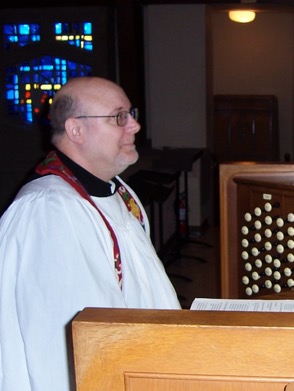Mark Scott’s Sermon
Mark’s Sermon
by Rev. Dr. Fritz Ritsch
Phil. 4: 4-9
John 15: 1-13
Mark’s sister Sue says that when Mark was about 11, he decided he wanted a desk for his room. He cut a deal with a local furniture store to buy himself a very nice desk for which he’d pay a dollar a week. So far as I know it’s paid off. Anyway, his mom wanted to check his desk drawers to find out what was in them, I suppose for the usual reasons moms do such things; and discovered to her chagrin that even though there was no lock on the drawer, she could not open it! And though she demanded an explanation, or a key, Mark never let her open it. It turned out that Mark had taken a drill, drilled holes on both sides of the drawer from underneath, and stuck nails in either side so it couldn’t be opened.Read More »Mark Scott’s Sermon

